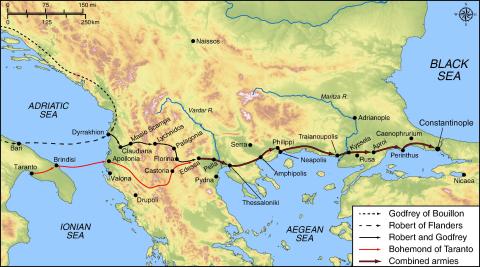Bohemond's March to Constantinople
[2.6.2] Forsitan adhūc ā nostrīs māiōribus saepe dēlūsī erimus. Ad ultimum, quid factūrī erunt? Dīcent quoniam necessitāte compulsī, nōlentēs volentēsque, humiliāvērunt sē ad nēquissimī imperātōris voluntātem. Fortissimō autem virō Boamundō, quem valdē timēbat, quia ōlim eum saepe cum suō exercitū ēiēcerat dē campō, dīxit, quoniam sī libenter eī iūrāret, quīndecim diēs eundī terrae in extēnsiōne ab Antiochīā retrō, daret, et octo in lātitūdine. Eīque tālī modō iūrāvit, ut sī ille fidēliter tenēret illud sacrāmentum, iste suum numquam praeterīret. Tam fortēs et tam dūrī mīlitēs, cūr hōc fēcērunt? Proptereā igitur: quia multā coāctī erant necessitāte.
notes
vocabulary
forsitan: perhaps
nēquam (nēquior nēquissimus): useless; morally worthless, depraved
ōlim: previously (OLD 1)
campus –ī m.: field (CL); battlefield; camp (ML)

